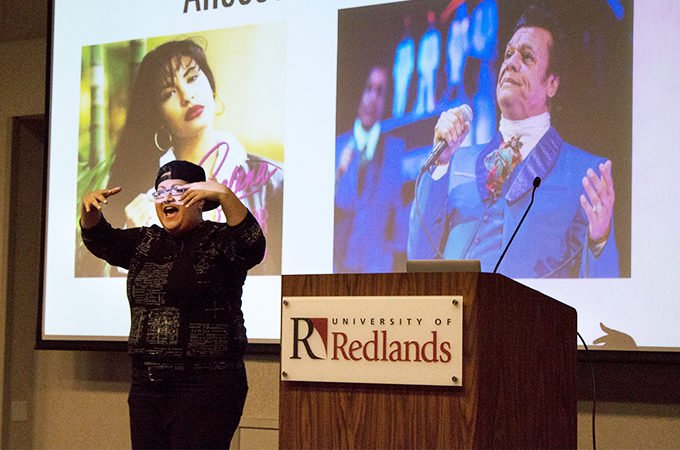Gabby Rivera, author of Juliet Takes a Breath and the Marvel Comics series America, gave a talk in the Orton Center last Thursday evening. In her talk, “Inspiring Radical Creativity and Empowering Young, Diverse Voices to Tell Their Own Stories,” Gabby imparted her warm, happy demeanor and words of wisdom to a captivated audience.
Rivera is a writer, a teacher, and a mentor for national LGBTQ+ youth organizations. Her first book, a young adult novel titled Juliet Takes a Breath, keys on Rivera’s experiences growing up as a queer Puerto Rican in the Bronx.
“In this book,” Rivera said, “I have a lot of fun subverting the narrative revolving around the idea that if you live in the hood, you have to get out of the hood in order to lead a successful life.”
Rivera went on to encourage the audience to “take a traditional story, disrupt it, shake up that narrative, and tell it in a different way. Put your experience and your ancestors’ experiences in that story and then make it your own.”
On the topic of ancestry, Rivera said, “Ancestors are not just faraway folks you’ve never heard of. They’re not just political figures or folks in your family albums.” She clicked to a PowerPoint slide to reveal a photo of Selena Quintanilla and other famous Latinx people. “If you think of the majesty of the legacy of Selena and young brown girls who grow up under that energy, that vibe that came from one person—that is ancestry. That sits in your bones.”
Rivera also highlighted her heritage and discussed her disconnect with her grandparents. Rivera’s parents are bilingual, but Rivera doesn’t speak Spanish, and, therefore, was unable to have the deep, meaningful communication she wanted to have with them.
Rivera was working on Juliet Takes a Breath when she finally received the connection she’d been seeking. “I was writing this book, and I was like, ‘Okay, she’s queer, that’s cool,’” Rivera said of the main character. “But how was I going to talk about being Latinx in this book? How do I talk about ancestry in Puerto Rico? I was struggling. I needed support from my family. I went to talk to my mom about it, and my grandpa was there, and he told us, in his mix of broken English and Spanish, the story of how he met my grandmother. I was so excited; I thought, ‘It’s happening. It’s finally happening!’”
Rivera recalled a day when she got an email that read, “Would you ever want to write for Marvel?” She thought it was a joke.
“I thought, ‘Oh man, what kind of virus did I just give my computer?’” she recounted with a laugh.
Although she had a hard time believing she was good enough to write for Marvel, she mustered up the courage to accept the job. Her new Marvel Comics series, America, stars America Chavez, Marvel’s first queer, Latina superhero. America Chavez was already part of the Marvel universe, but she didn’t have her own story until Rivera was given the opportunity to write it.
“She had a girlfriend when I got her. Broke that up,” Rivera said, receiving laughter from the audience.
“Because she can punch portals through dimensions,” Rivera said of America’s superpowers, “she is, in essence, a Latina with no boundaries. She is free to travel across borders, anywhere she wants. That is a world that does not exist. I get to make it exist.”






